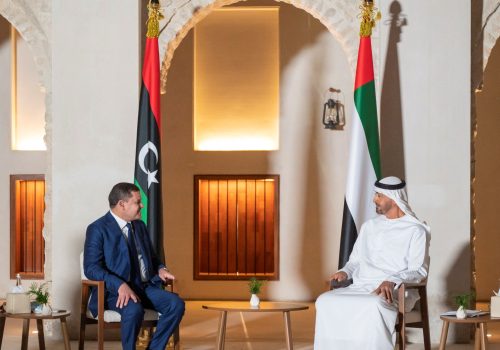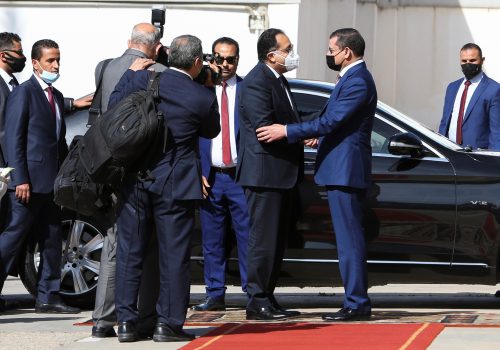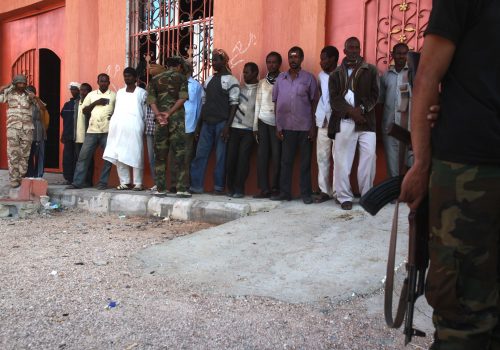A moment of opportunity: Can the UN’s new special representative for Libya break the country’s cycle of devolution?
While a precarious ceasefire has uneasily prevailed in Libya since the end of its third bout of civil war in 2020, the country is increasingly showing signs of an eventual relapse into conflict today. This may be why many policymakers were quick to hail as a breakthrough the appointment of Senegalese diplomat Abdoulaye Bathily as the Special Representative of the Secretary-General (SRSG) for Libya and head of the United Nations (UN) Support Mission to Libya in September. After two months into the job, SRSG Bathily may be quickly realizing that Libya’s war never abated, and that it is now simply fought by other means in the halls of the UN and corridors of foreign capitals.
History’s measure of success for Bathily’s tenure will not be his appointment but the extent to which the political process he devises and shepherds breaks the devolution cycle that the current Libyan status quo gives rise to. To be remembered as a UN official that positively influenced Libya’s trajectory will be no easy feat, particularly at a time when the UN is viewed as powerless by Libyan elites and is distrusted by the Libyan public. To counteract these perceptions and chart the most constructive way forward towards elections, SRSG Bathily must build on lessons learned from past political processes and avoid the pitfalls that obstructed them.
Over the past years, the overarching political processes pushed under the UN’s aegis in Libya were characterized by differing dynamics and leadership styles. For instance, the Libyan Political Dialogue Forum (LPDF) and its roadmap reshuffled Libya’s executive and placed Libya on a staggered electoral path in early 2021. The pre-electoral period, overseen by Special Representative of the Secretary-General Jan Kubis, saw a contested basis for elections manufactured by Libya’s parliament speaker Agila Saleh, which was, by and large, an effort to weaponize hundreds of thousands of Libyans’ yearning for political change. The post-December 2021 era saw the UN controversially focus on constitutional amendments between Libya’s two conniving legislative chambers: the High State Council and the House of Representatives. As these entities conspired to delay elections, the country relapsed into executive bifurcation and edged closer to conflict.
Dwelling on the past misfortunes of these processes may be futile. However, a key takeaway is that each phase saw Libyan elites, spoilers, or stakeholders position themselves to maximize their chances at political relevance and longevity. Each process also afforded them a space to cripple UN mediation depending on the perceived leeway they felt they were given. Libyan elites’ perceived space and ability to spoil processes were often positively associated with the levels of international disunity they observed. Indeed, Libyan politicians, the vast majority of whom have held official positions for the better part of the last decade, have become adept at exploiting international differences to their advantage.
For Bathily, one lesson learned from all these processes should be to minimize the agency of Libyan elites over Libya’s fate. The notion that a Libyan-owned process is one that the venal and self-serving must approve of is a fallacy. In fact, rendering elites the custodian of any process is bound to fail because they have a vested interest in either forcing said process’ collapse or manipulating it to their advantage. Different permutations of this dynamic abounded over the past two years. To name but a few: House of Representatives (HoR) Speaker Saleh’s flawed and unilaterally issued electoral law; High State Council’s (HSC) President Khalid Mishri’s constant backpedaling on bilateral agreements; General Khalifa Haftar’s intimidation of other presidential candidates in the run-up to the December 2021 presidential election; Government of National Unity Prime Minister Abdelhamid Dbaiba’s contravention of the LPDF Roadmap; and aspiring Prime Minister Fathi Bashagha’s attempts at forcing a fait accompli through dubious parliamentary procedures and violence.
This wide cohort of Libyan spoilers complicates devising a process that would rein all of them in. This is made more challenging by the fact that these spoilers generally benefit from the regional backing of states that egg on their worst impulses. Even-handedly considering all these actors as potential spoilers in designing any process is preferable to focusing on constraining or enabling exclusively one. The failure of past processes was partly rooted in the fact that they did not operate as such, allowing different spoilers to take turns manipulating outcomes accordingly.
The need for political change also warrants out-of-the-box thinking. Somehow, it is taken as gospel today that any process to push Libya forward needs the rubber stamp of the HoR and the HSC. This assumption not only limits problem-solving abilities and would saddle even the most well-intentioned of mediators, but also lacks any meaningful justification. The legitimacy of most institutions and bodies present today in Libya is legally dubious and socially inexistent. Moreover, the notion that finding alternatives to overriding these weak institutions is an infringement of sovereignty is an argument that no one puts forward but these spoilers themselves. Ironically, few entities today are more widely despised by the average Libyan than the two legislative chambers that many policymakers counterproductively empower.
There are several tools in the mediation toolbox for forging a more constructive path without falling prey to the allure of chasing the chimera of an HSC-HoR agreement. And, here, perhaps the LPDF and its roadmap are the best example of a process that created a narrative of inevitability—all while diluting the HSC and HoR monopoly over decision-making. For all the drawbacks of the LPDF, it did achieve one of the most significant shifts in Libya’s political landscape in recent years. It also constricted Libyan spoilers’ room to maneuver, as they knew their only chance of a political future was to engage with the process and adapt accordingly.
This narrative of inevitability was not rooted in the reliability of the LPDF process or its roadmap, but rather the levels of international cohesiveness and multilateralism behind them. Not one spoiler dared to overtly contest the LPDF’s outcomes, and most spoilers even opted to play by the rules of the game by running for elections, eyeing the presidency. Unfortunately, the pre-electoral phase saw its problems with a blinkered outlook that expediently urged a focus on meeting an electoral date in favor of an electoral process that guaranteed long-term stability. Bathily should avoid this pitfall while seeking to recreate the narrative of inevitability. To this end, he should focus part of his tenure on canvassing and engaging with foreign policymakers, as no good will come of the impulse to ignore the fact that much of what happens in Libya is decided outside of it.
One last recommendation for Bathily is a missed and often-overlooked opportunity: the legitimacy of his political process can be grounded in popular will and technical expertise. 2.8 million people signing up for the 2021 December elections is not a mere slogan to be repeated ad nauseam in briefings and statements, but rather a reality that justifies forging ahead. Moreover, the monopolization of negotiations around the legal, procedural, chronological, and operational dimensions of Libya’s political path by Libyan political representatives can render plans flawed purely because of a lack of competence and knowledge. Ignorance being the enemy of progress is the easiest justification for widening the pool of Libyan interlocutors and custodians to those with the know-how, experience, and will to push Libya forward.
The silver lining in Libya’s contemporary situation is that it is a moment of opportunity. There is room for creativity, genuine progress, and a real chance for a much-needed political breakthrough. It is, however, also a watershed moment for Libya’s spoiling elites, which are already maneuvering to stop any chance at progress in its tracks. Time is of the essence: should the initiative be once again surrendered to spoilers and their broader designs, Libya may again spiral back into a conflict to the detriment of ordinary Libyans and those that complacently watched the country’s downfall.
Emadeddin Badi is a senior non-resident fellow at the Atlantic Council’s Middle East Program. Follow him on Twitter @emad_badi.
Further reading
Thu, Oct 27, 2022
The UAE is making a precarious shift in its Libya policy. Here’s why.
MENASource By Emadeddin Badi
As an influential actor in the Libyan landscape for over a decade, it comes as no surprise that changes in Emirati policy have had a direct impact.
Tue, Jun 1, 2021
Egypt recalibrated its strategy in Libya because of Turkey
MENASource By
It is evident that the strategic pivots of Egyptian leadership in Libya are adapting and evolving in concordance with developments on the ground and keeping in mind wider regional implications—particularly its relations with Turkey.
Fri, May 21, 2021
Libya has a mercenaries problem. It’s time for the international community to step up.
MENASource By
One of the darker realities of the war in Libya is that the conflict (now in its eleventh year) is powered by layers of actors from outside the contested territory. Libyans have been killed and their country ravaged by foreign soldiers of fortune.
Image: A member of the Libyan armed unit, 444 Brigade, backing the Government of National Unity (GNU) and its Prime Minister Abdulhamid al-Dbeibah, stands near a military vehicle in Ain Zara area in Tripoli, Libya, July 22, 2022. REUTERS/Hazem Ahmed


